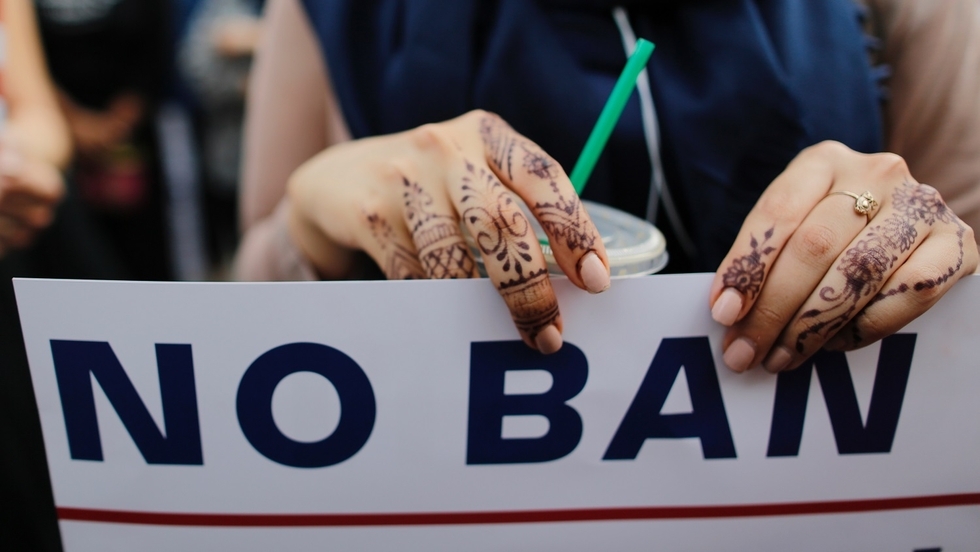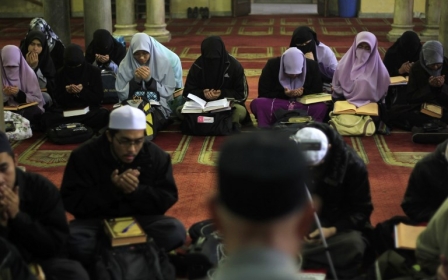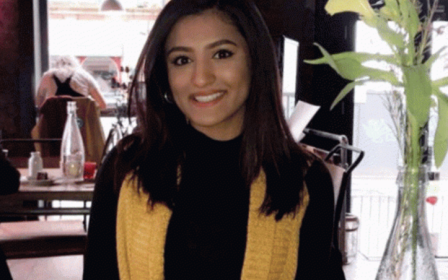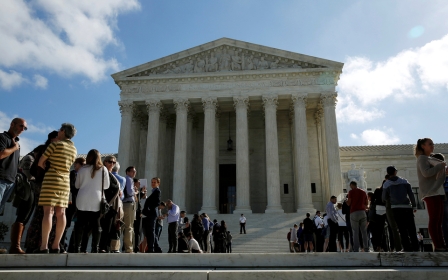Fear spreads among US Muslims in wake of travel ban

When President Donald Trump signed his first “Muslim ban” in January, immediately putting it into effect, it caused overwhelming chaos and opposition.
A few months and several legal battles later, what the Supreme Court allowed of the second executive order is far less reaching and affects fewer people.
But the indirect political ramifications of the ban are just as severe and amount to institutionalised Islamophobia, community advocates say.
Two weeks ago, Trump’s travel ban went into effect. The Supreme Court allowed the White House to temporarily deny entry to the citizens of six Muslim-majority nations if they do not have a "bona fide" relation to a US person or entity. The Justice Department interpreted the ruling to allow only immediate family members, applying the ban to grandparents, aunts, uncles and cousins of US citizens from the countries on the list.
Trump’s January decree, which banned even legal permanent US residents from Iraq, Syria, Iran, Somalia, Yemen, Libya and Sudan, was replaced with one that excluded Iraq and did not apply to visa holders after it was suspended in courts.
While the high court’s decision seems to have diluted the “watered down” version of the ban, activists say it is still affecting lives and stoking fear of Muslims.
US citizens impacted
Walid Fedama, a prominent Yemeni American activist in the Detroit area, said it already takes years for Yemeni Americans to petition for their spouses and children to join them from Yemen.
The ban, however, is causing anxiety in the Yemeni community, which feels targeted, he said.
“As the impact goes, frankly, people are scared, even people with US passports are scared,” he said. “The first time [in January] people went out, and the organisations and politicians rallied against the president. But when the decision comes from the Supreme Court, it’s different. You know, there is no one but God above the Supreme Court.”
Fedama rejected the administration’s national security rationale behind the ban. He said the biggest source of terrorism in Yemen is the Saudi-led war against Houthi rebels, which is supported by Washington.
Gadeir Abbas, a lawyer who represents the Council on American-Islamic Relations (CAIR), said the ban separates family members.
It has been already difficult for Muslim foreign nationals to get US visas, Abbas said, but the ban now makes it impossible for some people to come to the US while deterring others from even applying.
“The solution to the discriminatory immigration system is not to make it more discriminatory,” he said.
Abbas added that US citizens all over the country are impacted by the executive order.
“I can’t invite my uncles in Iran to come see my daughter who will be born Inshallah later in about a month,” he told MEE. “Other US citizens cannot continue their periodic visits with cousins. In the Middle East and South Asia and other parts of the world, cousins are considered immediate family.”
Uncertainty
Mohammed Abdrabboh, a Dearborn-based civil rights lawyer, said amid ongoing legal challenges, the ban has caused doubt that has forced people to reconsider or cancel their plans to come to the US.
Abdrabboh told Middle East Eye that the biggest practical effect of the ban is the fear and uncertainty that it has spread.
If this administration is willing to ban our relatives, what else is it willing to do?
- Elham Khatami, NIAC
But beyond the executive orders, Abdrabboh said there have been broad restrictions on the admission of people from Muslim-majority countries by the discretion of US government bureaucrats.
“There’s an ongoing pattern of delay in immigration benefits generally for people from Muslim countries, especially if you’re a young man,” he said.
He cited the case of his pregnant client whose parents were denied a visitation visa from Lebanon to be in the US for the birth of their grandchild. He said the applicants had “substantial ties to Lebanon” and a return ticket, but were turned down without being granted an interview.
“That’s the part that is not only impossible to challenge but is fundamentally unfair,” he said. “The question becomes: would the same fact pattern have happened if it were a non-Muslim country?”
On Tuesday, an Iranian doctor and his family were detained and sent back to their home country at a Boston airport for reasons unrelated to the travel ban, US Customs and Border Patrol (CBP) said. The doctor had a visiting scholar visa and was going to work at Boston children’s hospital.
He was denied entry by CBP agents. The agency said travellers can be refused admission to the US for a variety of reasons, including health issues, criminality and national security.
Shayan Modarres, a lawyer for National Iranian American Council (NIAC), a Washington DC-based advocacy group, said the organisation is requesting government data on Iranians being turned away at US ports of entry to document any discrimination stemming from the Muslim ban at the hand of bureaucrats.
‘Institutionalised Islamophobia’
Elham Khatami, outreach director at NIAC, said there has been a “slow trickle” of stories of people being affected by the Supreme Court’s ruling.
“While there hasn’t been a particular case that has really stood out, what we’re hearing from the Iranian American community is this feeling of confusion, of fear and of sadness - ‘Why is it that our community is the one being targeted? Why is it that my grandparents or my uncle or my aunt can’t come to the United States?’” Khatami told MEE.
She added that there is a “pervasive feeling” among Iranian Americans that they are being scapegoated.
You can imagine the devastation of having been forced to flee your home, living years in a refugee camp with the hope of going, and then all of a sudden being told, 'No, the door is being shut.'
- Lee Williams, USCRI
“If this administration is willing to ban our relatives, what else is it willing to do?” Khatami said.
Abbas, of CAIR, echoed Khatami’s comment on the political ramifications of the ban, saying that "institutionalised Islamophobia" has reached a “fever pitch”.
“Any time policy is being determined by Islamophobia, the community is at risk, and that causes alarm for everybody,” he said.
The Supreme Court also allowed a ban on all refugees who do not have credible relations to US citizens.
Trump has slashed the cap on refugee admissions from 110,000 during the last year of the Obama administration to 50,000, but those admitted during the 120-day ban will not count towards that number. The ban will go into effect on Thursday after the cap is reached, according to the State Department.
Abdrabboh, the lawyer, said the refugee ban is a nod to Trump’s nationalist base.
“It’s intended to send a message that we’re no longer a country welcoming refugees, as per a decision taken by the executive,” he said. “As a practical matter, because of the relatively minuscule amount of refugees that we accept compared to Europe and compared to the size of our population and our country, it’s more of an intended political statement for the far right.”
Lee Williams, vice president of US Committee on Refugees and Immigrants (USCRI), a resettlement agency, highlighted the suffering caused by the ban on refugees.
"For the clients who have been near to coming to the United States through the resettlement programme, many of them may have sold off all of their belongings at the camps... You can imagine the devastation of having been forced to flee your home, living years in a refugee camp with the hope of going, and then all of a sudden being told, 'No, the door is being shut.'"
Middle East Eye propose une couverture et une analyse indépendantes et incomparables du Moyen-Orient, de l’Afrique du Nord et d’autres régions du monde. Pour en savoir plus sur la reprise de ce contenu et les frais qui s’appliquent, veuillez remplir ce formulaire [en anglais]. Pour en savoir plus sur MEE, cliquez ici [en anglais].




